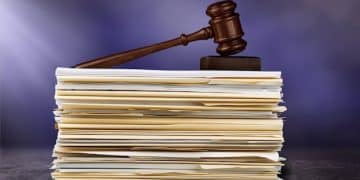Election Security Debates: Understanding the Current Challenges

Current debates surrounding election security and integrity encompass discussions on voter access, cybersecurity, voting machine vulnerabilities, and campaign finance regulations, all aimed at ensuring fair and trustworthy elections.
The integrity of elections is paramount to the functioning of a democratic society. However, numerous challenges and controversies are reshaping the landscape. Let’s delve into the **current debates surrounding election security and integrity** to shed light on vital aspects.
Understanding Voter Access and ID Laws
One of the most contentious issues in election security is voter access. This involves debates over voter ID laws, registration processes, and early voting options. The core question is how to balance security measures with ensuring that eligible citizens can easily exercise their right to vote.
The Debate on Voter ID Laws
Voter ID laws require individuals to present identification before casting a ballot. Proponents argue that these laws are essential to prevent voter fraud, maintaining the integrity of the election process. Opponents, however, contend that these laws disproportionately affect minority groups, low-income individuals, and the elderly, who may have difficulty obtaining the required identification.
- Impact on Turnout: Studies show varied effects of voter ID laws on voter turnout.
- Accepted Forms of ID: The types of IDs accepted vary by state, creating confusion.
- Federal vs. State Laws: The interplay between federal mandates and state autonomy.
Ultimately, the debate hinges on whether the benefits of preventing voter fraud outweigh the potential disenfranchisement of eligible voters. Different states have adopted varied approaches, reflecting differing priorities and political landscapes.

Cybersecurity Threats to Elections
Cybersecurity has emerged as a significant concern in modern elections. The potential for foreign interference, hacking of voter databases, and manipulation of electronic voting machines raises serious questions about the security of the electoral process.
Protecting Voter Databases
Voter databases contain sensitive information, making them attractive targets for hackers. Breaches can lead to voter suppression, identity theft, and erosion of public trust in the electoral system. Defending these databases requires robust cybersecurity measures and constant vigilance.
- Encryption Protocols: Implementing strong encryption to protect voter data.
- Regular Audits: Conducting regular security audits to identify vulnerabilities.
- Incident Response Plans: Developing plans to respond effectively to cyberattacks.
The debate centers on resource allocation, technological solutions, and the need for collaboration between federal, state, and local authorities.
Voting Machine Vulnerabilities
The security of voting machines is another critical aspect of election integrity. Concerns about potential malfunctions, hacking, and lack of audit trails have fueled debates over the types of machines used and the safeguards in place.

Many experts push for the use of paper ballots, which can be manually recounted and provide a tangible audit trail. However, this method is not without its drawbacks, including higher costs and the potential for human error.
The Push for Paper Ballots
Paper ballots offer a verifiable record of each vote, reducing the risk of manipulation and providing a reliable basis for recounts. They are seen by many as a more secure alternative to electronic voting machines.
Ensuring that electronic voting machines meet rigorous security standards and are subject to thorough testing remains a challenge. The debate involves technical expertise, financial resources, and political will.
Campaign Finance Regulations
Fairness and transparency in campaign finance are essential for maintaining election integrity. Debates often revolve around the role of money in politics, the influence of Super PACs, and the disclosure of campaign contributions.
Transparency in campaign finance helps to ensure that voters know who is funding political campaigns and what interests may be influencing candidates. Disclosure requirements allow the public to scrutinize campaign contributions and spending.
The Impact of Dark Money
Dark money, which refers to funds spent on political campaigns by organizations that do not disclose their donors, is a growing concern. This lack of transparency makes it difficult to track the flow of money and assess its influence on elections.
- Disclosure Laws: Strengthening laws to require greater transparency in campaign finance.
- Enforcement Mechanisms: Enhancing enforcement to ensure compliance with regulations.
The debates over campaign finance regulations highlight the ongoing tension between free speech rights and the need to prevent corruption and undue influence in politics. It is an area where legal, ethical, and practical considerations often clash.
The Role of Misinformation and Disinformation
The spread of misinformation and disinformation poses a significant threat to election integrity. False or misleading information can influence voter behavior, undermine trust in the electoral process, and even incite violence.
Combatting misinformation requires a multi-faceted approach that includes education, media literacy, and fact-checking. Social media platforms also have a role to play in curbing the spread of false information on their sites.
Strategies for Combating Misinformation
Educating voters about how to identify and verify information is crucial to preventing the spread of misinformation. Media literacy programs can equip individuals with the skills to critically evaluate news and information sources.
The challenge lies in striking a balance between freedom of expression and the need to protect the integrity of public discourse. The debate involves ethical considerations, legal frameworks, and technological solutions.
Ensuring Fair Redistricting
Redistricting, the process of redrawing electoral district boundaries, can have a significant impact on election outcomes. Gerrymandering, the practice of drawing district lines to favor one political party, is a persistent problem in many states.
Independent redistricting commissions, which are non-partisan bodies tasked with drawing district lines, have been proposed as a way to reduce gerrymandering. These commissions aim to create more competitive and representative districts.
The Fight Against Gerrymandering
Legal challenges to gerrymandered districts have been mounted in many states, with varying degrees of success. Courts have ruled that some gerrymandered districts are unconstitutional, but the legal standards for proving gerrymandering remain complex.
- Independent Commissions: The benefits and drawbacks of using independent redistricting commissions.
- Judicial Review: The role of courts in ensuring fair redistricting.
- Legislative Reforms: Efforts to reform the redistricting process through legislation.
Ensuring fair redistricting is essential for maintaining a level playing field in elections and promoting democratic accountability. The debate involves legal battles, political maneuvering, and public advocacy.
The Future of Election Security
The future of election security will likely involve a combination of technological innovation, legal reform, and increased public awareness. New technologies, such as blockchain voting systems, may offer enhanced security and transparency.
Technological solutions can play a role in improving election security, but they are not a panacea. The human element, including the training of election officials and the education of voters, remains critical.
The Role of Technology in Election Security
Exploring the potential of blockchain technology, artificial intelligence, and other innovations to enhance election security. Evaluating the costs, benefits, and risks of new technologies.
| Key Point | Brief Description |
|---|---|
| 🗳️ Voter ID Laws | Debate over preventing fraud vs. disenfranchisement. |
| 🛡️ Cybersecurity Threats | Concerns about hacking voter databases and foreign interference. |
| 📜 Voting Machine Vulnerabilities | Debate over paper ballots vs. electronic machines. |
| 💸 Campaign Finance | Debates on transparency and dark money influence. |
Frequently Asked Questions
▼
The central debates involve balancing the need to prevent voter fraud with concerns about potential disenfranchisement of eligible voters, particularly those in marginalized communities.
▼
Cybersecurity threats are a major concern. Hacking of voter databases, manipulation of electronic voting machines, and foreign interference all pose substantial risks to election integrity.
▼
Electronic voting machines can be susceptible to hacking, malfunctions, and lack audit trails. The push for paper ballots aims to address these concerns by providing a verifiable record of each vote.
▼
Controversy stems from the balance between free speech rights and the need to prevent corruption. The influence of dark money and the disclosure of campaign contributions are key points of contention.
▼
Misinformation can significantly undermine trust in elections. False or misleading information can influence voter behavior and incite violence, necessitating robust fact-checking and media literacy initiatives.
Conclusion
As we navigate the complex landscape of election security, it is clear that there are no easy answers. Striking a balance between accessibility, security, and fairness is essential for maintaining public trust in the democratic process. Ongoing dialogue and continuous improvement are necessary to safeguard the integrity of elections.





